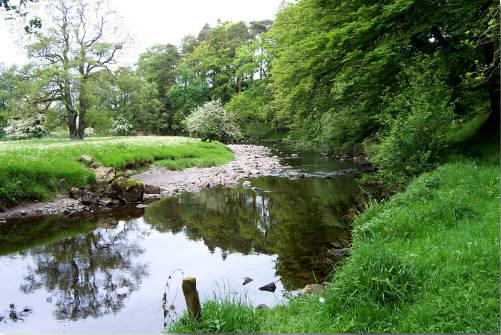
Flow gently, sweet Afton! amang thy green braes,
Flow gently, I’ll sing thee a song in thy praise;
My Mary’s asleep by thy murmuring stream,
Flow gently, sweet Afton, disturb not her dream.Thou stockdove whose echo resounds thro’ the glen,
Ye wild whistling blackbirds in yon thorny den,
Thou green-crested lapwing thy screaming forbear,
I charge you, disturb not my slumbering Fair.How lofty, sweet Afton, thy neighbouring hills,
Far mark’d with the courses of clear, winding rills;
There daily I wander as noon rises high,
My flocks and my Mary’s sweet cot in my eye.How pleasant thy banks and green valleys below,
Where, wild in the woodlands, the primroses blow;
There oft, as mild Ev’ning weeps over the lea,
The sweet-scented birk shades my Mary and me.Thy crystal stream, Afton, how lovely it glides,
And winds by the cot where my Mary resides;
How wanton thy waters her snowy feet lave,
As, gathering sweet flowerets, she stems thy clear wave.Flow gently, sweet Afton, amang thy green braes,
Flow gently, sweet river, the theme of my lays;
My Mary’s asleep by thy murmuring stream,
Flow gently, sweet Afton, disturb not her dream.Robert Burns, 1791
I’m not entirely sure why, but this poem’s been on my mind ever since my son Elias was born on Sunday. I must admit to first being introduced to it by Nickel Creek, who included a musical version of it on their debut album, framed by a melody which is so clear and appropriate that one feels that it could not have had any author.
There is something about the anchoring of and in place that comes forward at the birth of a child, particularly (if I may) a son. Since the days of Adam, men have as part of their vocation on this earth to provide stability, unity and name. (And women provide civilization and a motivation for men to undertake their calling.)
Both of my children have so far been born in Pennsylvania, while both their parents are native Virginians. This seems right to me, in a way I cannot quite explain but which is particularly informed by the reality that, in my own immediate family, between five members are five native states. That’s just how things turned out for us, but it’s not something I’d like to perpetuate.
With a new man comes a new grounding in the ecology (per Prof. Alfred Siewers, “the story of home”), a new generation to be ordered among the fathers and grandfathers. Here in 21st century America, the fathers and grandfathers rarely call the same place home.
My prayer is that my generation may be among the last to be so scattered across this world. It seems to me that the Incarnation almost expects it.




Congratulations on the birth of your son! May God grant him many years.
I love the poem and especially the photo. It seems so
refreshing on this bleak day.
The photo, alas! is not mine. I wish it were.
Father, bless! Ah, such lilting poetry is not written very often these days. Now I think you should put your hand to literary criticism of Keats “Ode on a Grecian Urn.” 🙂
Having come from Scottish stock on my father’s side, I’ve often felt a calling to visit that land. From all the photos I’ve seen, its beauty seems overwhelming.
I concur that having a son is quite different than having a daughter. For one, a son carries on the family name. But a daughter’s heart seems never to stray too far from home. I think it has something to do with that addage, “A son is your son til’ he takes him a wife. A daughter’s your daughter for the rest of her life.”
Christ’s blessings to you and your family. May you always keep the Lord ever before you.
In Christ’s Immeasurable Love,
Darlene
So many finer people than I have written on Keats! But I may well say something about that piece at some point, both since you asked and also because contemplating it was one of the elements in my conversion to Orthodox Christianity.